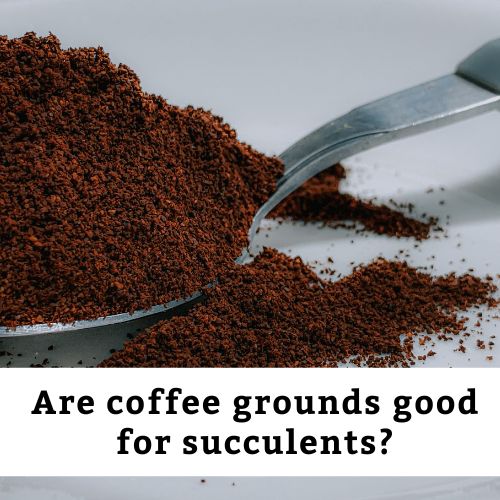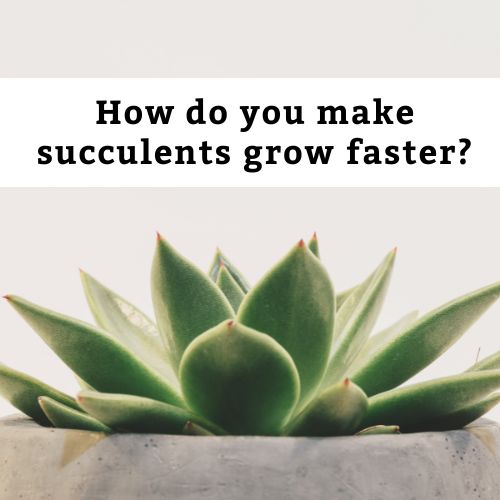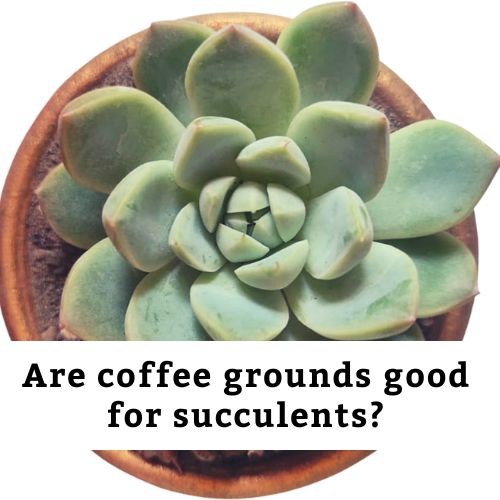Are coffee grounds good for succulents?
Coffee grounds are a popular natural fertilizer for plants because they contain several essential nutrients that can benefit plant growth. Here are some reasons why coffee grounds are good for indoor and outdoor plants:
- Nitrogen-rich: Coffee grounds are a rich source of nitrogen, one of the primary nutrients plants need for healthy growth. Nitrogen is essential for the development of leaves, stems, and other above-ground parts of the plant.
- Other nutrients: In addition to nitrogen, fresh coffee grounds also contain other nutrients that are beneficial for plants, including phosphorus, potassium, calcium, and magnesium. These nutrients help to support various aspects of plant growth, such as root development and flower production.
- Organic matter: Coffee grounds are an excellent source of organic matter, which can help to improve soil structure and fertility. Organic matter provides food for garden soil microbes, which break down the coffee grounds and release nutrients into the soil.
- pH level: Coffee grounds are slightly acidic, which can be beneficial for plants that prefer acidic soil conditions. However, it’s important to note that excessive use of coffee grounds can lower soil pH to an unhealthy level for some plants.
- Pests and diseases: Unbrewed Coffee grounds contain compounds that can help to deter pests and diseases. For example, caffeine is toxic to insects like slugs and snails, which can damage plants by feeding on leaves and stems.
Overall, using coffee grounds as a natural fertilizer for plants can be a great way to improve soil fertility, provide essential nutrients, and deter pests and diseases. However, it’s important to use coffee grounds in moderation and to mix them with other organic materials to avoid over-acidifying the soil. Additionally, it’s important to avoid using coffee grounds on plants that prefer neutral or alkaline soil conditions.
Are coffee grounds good for succulents?

Yes, coffee grounds can be good for indoor and outdoor succulents. Coffee grounds are rich in nitrogen, which is an essential nutrient for plant growth. They also contain other nutrients like potassium, phosphorus, and magnesium, which are important for plant growth and health.
When using coffee grounds for succulents, it’s important to use them in moderation as they can be acidic and may affect the pH balance of the soil. Mixing the coffee grounds with other organic materials like peat moss, coconut coir, or compost is also important to create a well-draining and nutrient-rich soil mix.
Mix coffee grounds for potted succulents into the soil before planting or sprinkle them on top of the soil as a top dressing. However, avoid using coffee grounds as the sole source of nutrients for your succulents and monitor the soil moisture levels to avoid overwatering.
Which plants do not like coffee grounds?
While coffee grounds can be beneficial for many outdoor and indoor plants, there are a few plants that may not like them. Here are some plants that are sensitive to coffee grounds:
- Blueberries: Coffee grounds can increase the acidity of the soil, which may not be ideal for blueberries that require slightly acidic soil.
- Geraniums: Geraniums prefer well-draining soil, and coffee grounds can retain moisture, leading to waterlogged soil that can damage the plant.
- Asparagus: Asparagus prefers neutral to slightly alkaline soils, and coffee grounds can make the soil too acidic.
- White clover: Coffee grounds can inhibit the growth of white clover, making it difficult for the plant to thrive.
- Wormwood: Wormwood does not like coffee grounds as they can stunt the growth of the plant.
While these plants may not like coffee grounds, it’s important to note that the effects of coffee grounds on plants can vary depending on the type and amount of coffee grounds used, as well as the plant’s specific growing conditions. It’s always best to use coffee grounds in moderation and to observe how your plants react to them.
Which succulents like coffee grounds?
Many succulents can benefit from the use of coffee grounds in their soil. Here are some examples of succulents that are known to like coffee grounds:
- Jade plant: Jade plants can benefit from coffee grounds because they are nitrogen-rich, which can promote growth.
- Aloe vera: Aloe vera plants can benefit from coffee grounds because they contain potassium and phosphorus, which can promote flowering and overall health.
- Snake plant: Snake plants can benefit from coffee grounds because they can help to aerate the soil and improve drainage, which is important for the health of the plant.
- Echeveria: Echeveria plants can benefit from coffee grounds because they are rich in organic matter, which can improve soil structure and promote healthy growth.
- Sedum: Sedum plants can benefit from coffee grounds because they can help to retain moisture in the soil, which is important for succulent plants that don’t like to be overwatered.
When using coffee grounds for succulents, it’s important to use them in moderation and mix them with other organic materials like peat moss, coconut coir, or compost pile to create a well-draining and nutrient-rich soil mix. It’s also important to monitor the soil moisture levels to avoid much water.
Can I put coffee grounds on all my plants?
While coffee grounds can be beneficial for many plants, it’s important to note that not all plants will respond well to them. Some plants may be sensitive to the acidity of coffee grounds, while others may not benefit from the nutrients they provide. Here are some things to consider before putting coffee grounds on all your plants:
- Soil pH: Coffee grounds are acidic, which can lower the pH of the soil. Coffee grounds may not be the best option if plants prefer neutral or alkaline soil, like some herbs or vegetables.
- Plant sensitivity: Some plants, like azaleas, rhododendrons, and blueberries, are sensitive to acidic soil and may not do well with coffee grounds.
- Nutrient balance: While coffee grounds are a good nitrogen source, they may not provide all the nutrients your plants need. It’s important to use them in moderation and combine them with other organic materials like compost or coconut coir to create a balanced soil mix.
- Soil drainage: Coffee grounds can retain moisture in the soil, which can be beneficial for some plants but may be problematic for others. If you have plants that require well-draining soil, like succulents, it’s important to use coffee grounds in moderation and ensure that the soil is not becoming waterlogged.
Coffee grounds can be a good addition to your plant care routine, but it’s important to use them in moderation and observe how your plants respond to them. If you notice any negative effects, like yellowing leaves or stunted growth, avoiding coffee grounds on those plants may be best.
How do you make succulents grow faster?

Succulents are naturally slow-growing plants, but you can do a few things to encourage faster growth. Here are some tips for making succulents grow faster:
- Provide ample light: Succulents require plenty of bright, direct sunlight to grow and thrive. Place them near a sunny window or under grow lights for at least 6-8 hours a day.
- Use the right soil: Succulents need well-draining soil that allows water to pass through quickly. Use a mix formulated explicitly for succulents or add sand, perlite, or gravel to regular potting mix to improve drainage.
- Water correctly: Overwatering can lead to root rot and slow growth, so make sure to water only when the soil is completely dry. When you do water, thoroughly saturate the soil and allow any excess water to drain away.
- Fertilize occasionally: While succulents don’t require a lot of nutrients, occasional fertilization can encourage faster growth. Use a fertilizer specifically formulated for succulents, and apply it sparingly during the growing season.
- Provide ample space: Succulents need plenty of room to spread out and grow. Make sure to use a pot that’s appropriately sized for your plant and avoid overcrowding.
- Propagate: Propagation is a great way to increase your succulent collection quickly. Many succulents can be propagated from stem cuttings or leaves, which will quickly grow into new plants.
Remember that succulents are slow-growing by nature, and it’s important not to force them to grow too quickly. Your succulents will thrive and grow at their own pace with proper care and patience.
What is the best plant food for succulents?

The best plant food for succulents is a fertilizer specifically formulated for their needs. Succulents have different nutrient requirements than other plants, so choosing an appropriate fertilizer is important.
Here are some things to look for when choosing a plant food for your succulents:
- Low nitrogen: Succulents require a fertilizer with low nitrogen content, as too much nitrogen can cause excessive leaf growth and weaken the plant.
- High phosphorus and potassium: Phosphorus and potassium are important for promoting root growth, flowering, and overall plant health.
- Balanced nutrients: While succulents don’t require many nutrients, choosing a fertilizer that provides a balanced blend of micronutrients to support their growth is important.
- Water-soluble: A water-soluble fertilizer is easy to apply and allows the nutrients to be quickly absorbed by the plant.
- Slow-release: Slow-release fertilizers can provide a steady supply of nutrients over time, which can benefit succulents that don’t require frequent fertilization.
Some good options for plant food for succulents include:
- Jack’s Classic 20-20-20 All-Purpose Fertilizer
- Schultz Cactus Plus 2-7-7 Liquid Plant Food
- Espoma Organic Cactus Plant Food 2-7-7
It’s important to follow the instructions on the label when applying plant food to your succulents, as over-fertilizing can be harmful to their health. In general, it’s best to fertilize succulents sparingly, typically once or twice a year during the growing season.
What should I feed succulents?
Succulents don’t require a lot of nutrients to thrive, but it’s still important to provide them with the right balance of minerals and nutrients to support their growth and health. Here are some options for what you can feed your succulents:
- Commercial succulent fertilizers: Several commercial fertilizers (even chemical fertilizers) are specifically formulated for succulents, such as Espoma Organic Cactus Plant Food 2-7-7 or Miracle-Gro Succulent Plant Food. These fertilizers are designed to provide the right balance of nutrients for succulents and are often available in liquid or granular form.
- Fish emulsion: Fish emulsion is a natural fertilizer that’s high in nitrogen and phosphorus, which can encourage strong growth and flowering. Mix it with water according to the package instructions and apply it sparingly to your succulents.
- Compost tea is a nutrient-rich liquid fertilizer made from compost and water. It’s a natural and gentle way to provide your succulents with nutrients and can also help improve soil health and drainage.
- Epsom salt: Epsom salt is a good source of magnesium, which can help support succulent growth and health. Mix a tablespoon of Epsom salt into a gallon of water and use it to water your succulents once a month during the growing season.
When feeding your succulents, following the instructions on the product label and using fertilizers sparingly is important. Succulents don’t require a lot of nutrients, and over-fertilizing can actually harm them. In general, it’s best to fertilize your succulents once or twice a year during the growing season.